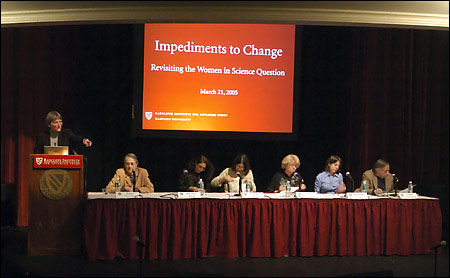Radcliffe conference presents a variety of views”

Impediments to Change: Revisiting the Women in Science Question” was one of a number of recent events at which faculty, administrators, and students have been able to share research and opinions on the issue of women in science. It featured several speakers whose research casts light on why women are underrepresented in math and science and how the situation can be changed. Among the speakers were: Mahzarin Banaji, Carol K. Pforzheimer Professor and 2004-2005 fellow, Radcliffe Institute for Advanced Study, and Richard Clarke Cabot Professor of Social Ethics, who administered a word association test to the audience that demonstrated implicit prejudice against women in science regardless of the gender or conscious belief of the subject. She concluded, however, by stating her conviction that “anything learned can be unlearned”; Elizabeth Spelke, Berkman Professor of Psychology, who reviewed the research on cognitive abilities in males and females and asserted that while some studies show slight differences in the way boys and girls approach math and science problems, there was no significant variation in their overall aptitudes in these subjects; Charles Rosenberg, Ernest E. Monrad Professor of the Social Sciences, who spoke about the persistence of 19th century habits of thought that equate what is with what ought to be and warned against simple mechanistic explanations that “jump out at us and explain something we need an explanation for.” – Ken Gewertz




